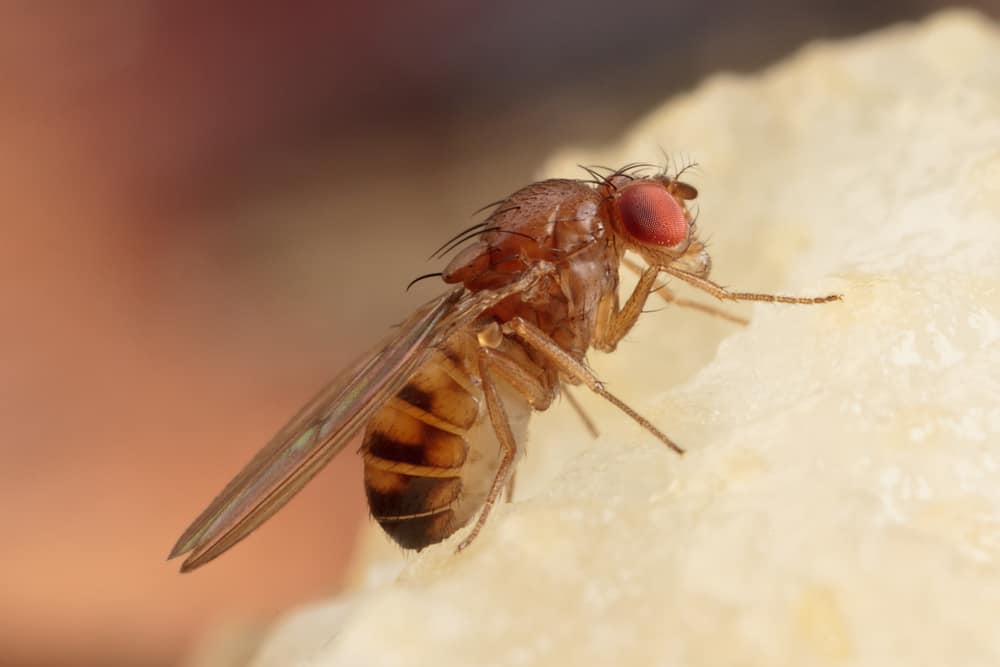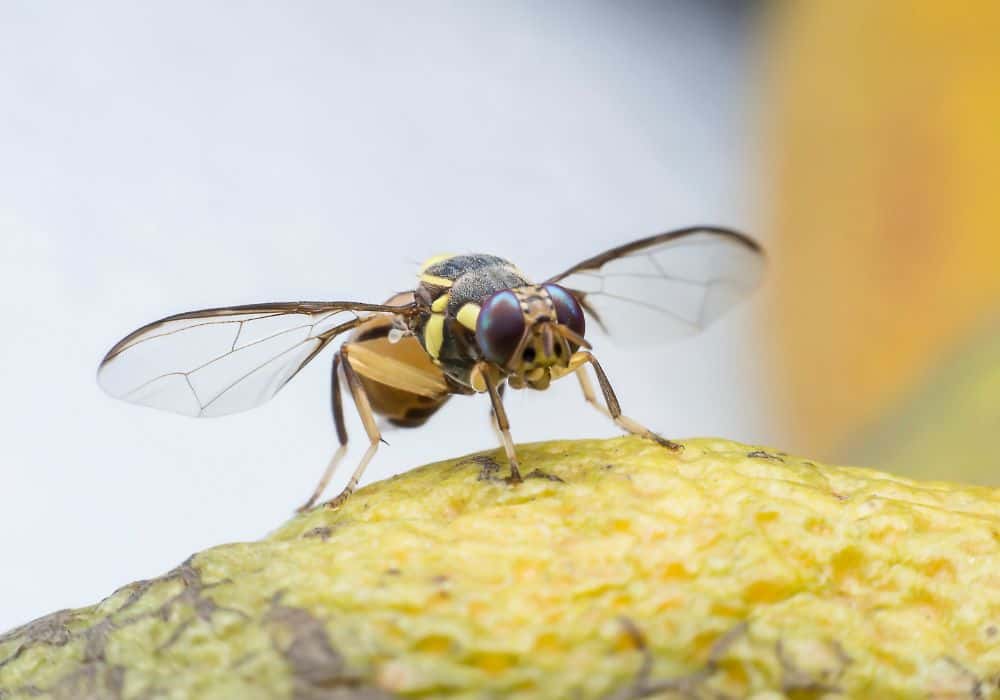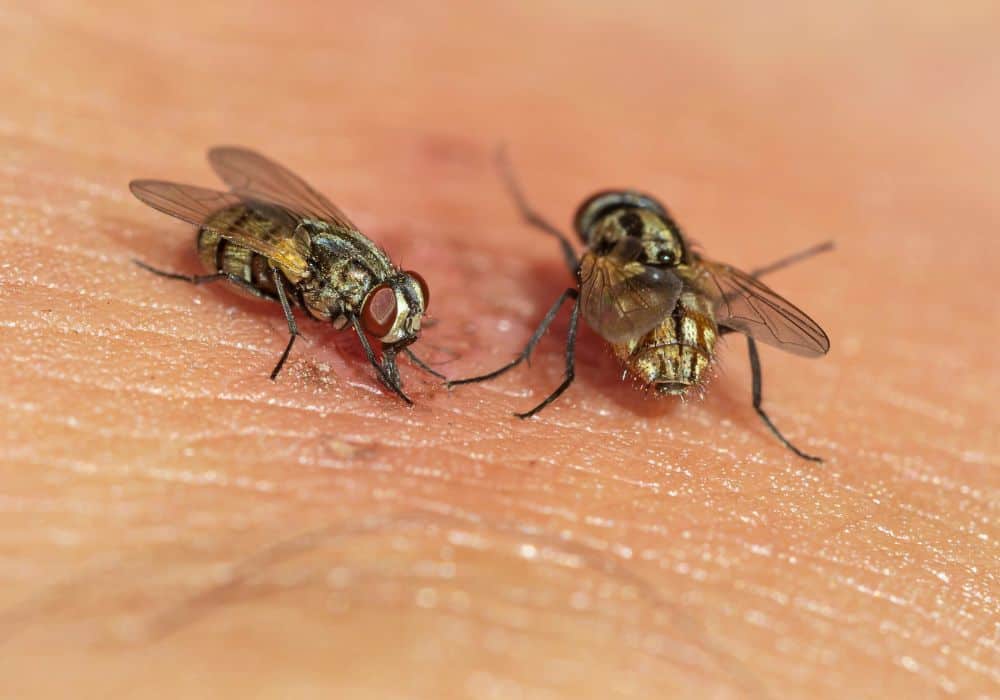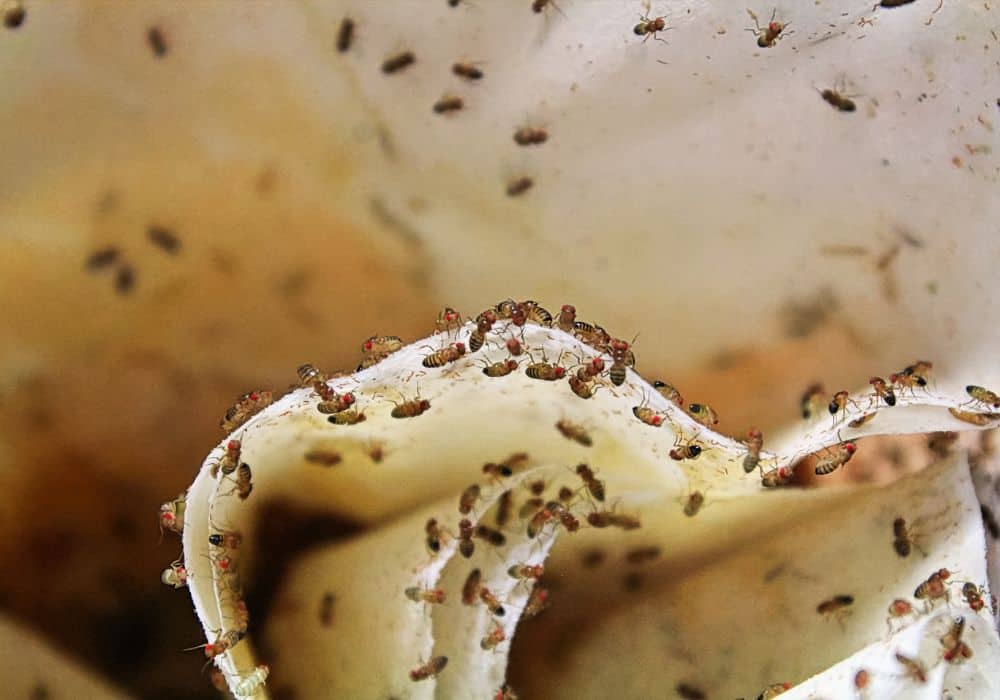According to a study from the Journal of Food Protection, fruit flies are responsible for many foodborne illnesses. So, what are the ways we can do to get rid of them?
In this article, we will discuss the habits and lifestyle of fruit flies, where they can lay their eggs, what foods they love to eat, and how we can prevent fruit fly infestation.
Fruit Flies Habits and Lifestyle
Fruit flies belong to the family Drosophilidae. They are also known as Drosophila melanogaster and are commonly seen in places wherever there is food. Sometimes, you would wonder where they come from as they appear out of nowhere to infest your home.
Generally, because of their antennae, they have the ability to smell the scent of sugary foods and drinks. Sometimes, wet cleaning supplies attract them too.
The average size of the common fruit fly is around 3.5 mm. They have round red eyes with brown-colored bodies
Although fruit flies can be active anytime inside your home, according to a study from the United States, fruit flies are most abundant during the autumn, late summer, early fall, or the hot and rainy seasons compared to cold and dry seasons.
Additionally, these insects work like humans. They look for food in the morning and they sleep at night. According to a study from Wisconsin, when flies are sleep-deprived, their vigilance and performance are impaired.
They also have this behavior that when they sleep, they become completely immobile. However, fruit flies have sensitive vibratory and auditory responses. Thus, their sensitivity to stimulus is very fast.
Where Do Fruit Flies Lay Eggs
Fruit flies prioritize mating over survival, and even when they are infected with pathogens, they will continue to mate. According to Harvard Medical School, fruit flies start to mate when the male taps the female fruit fly with its legs.
Within 30 hours, females will lay their eggs. According to the University of Kentucky College of Agriculture, Food, and Environment, the favorite place where they give life to their eggs include surfaces of fermenting foods.
Sometimes, females also lay eggs on wet organic materials as they use moisture to survive. Generally, they can lay up to 500-2,000 eggs. This is why their population is hard to control.
The hatched eggs will turn into small, white larvae and can nest in the materials where they were laid for four days, or until they have absorbed the nutrients they need to become adults.
What Do Fruit Flies Eat?
Fruit flies are predominantly omnivores as they also feed on honeydew produced by aphids. Generally, they are attracted to the sugary foods and products you ferment. These tiny pets are also fond of the spilled substances in your home.
In terms of how they search for food, research suggests that fruit flies prefer lower elevations and rainy seasons. Additionally, during the larva stage, they can eat up to 1.7 microliters per day.
After this stage, their diet will increase for 30 days. Then, it will eventually go back to 1.5 microliters per day.
Fruit Flies on Fruits
Fruit flies are named after their favorite snacks – fermenting fruits. Some of these fruits include bananas, tomatoes, apples, melons, squash, and potatoes.
Generally, fruit flies feed on the surrounding tissues of ripped fruits. This behavior can easily spread the bacteria into the center of the fruit.
Fruit Flies on Vegetables
Aside from fruits, these tiny insects love to snack on over-ripe vegetables. Sometimes, it is in these foods where they also lay their eggs. As soon as the eggs are hatched, they will already eat these veggies.
Some of these vegetables include rotten onions and mushrooms.
Adult Fruit Flies on Beverages
Another food choice of fruit flies includes alcoholic beverages. Beers and wines contain fermented sugars which fruit flies love to infest.
According to a study from California, fruit flies can tolerate high levels of ethanol. No matter how toxic alcohol is, fruit flies can adapt to it. In this study, it was also found that fruit flies use alcohol as their source of energy.
Initially, fruit flies can be intoxicated with alcohol, but, after long-term exposure, their bodies can deal with it.
Adult Fruit Flies on Garbage Can and Drains
Apart from food, these insects can also lay eggs on decaying materials on garbage disposals, sink drains, and skewers. These are unsanitary locations with odors that are pleasant to them.
When we talk about flies on drains and garbage cans, be careful as you might mistake drain flies for fruit flies.
Unlike fruit flies, drain flies are moth-like with fuzzy wings and tails. They are also smaller than the former.
Can Fruit Flies Get You Sick?
Humans are one of the main predators of fruit flies. Thus, before we can even attack them, they have already distanced themselves.
Although they do not bite, they can make you sick. The bacteria and germs they transmit into your food can cause many foodborne illnesses. According to the US Food and Drug Administration, these insects are the common cause of food contamination in the country.
The common bacteria you can get from consuming infested food include salmonella, E. coli, and listeria. All of these bacteria are capable of causing food poisoning, which can make you sick.
According to a study from Ireland, these bacteria cause gastrointestinal disorders that may last for seven days. Some of the symptoms of fruit fly poisoning include the following:
- Abdominal cramps
- Diarrhea with bleeding
- Fever
- Myalgia
- Headache
- Nausea and vomiting
Antibacterials are commonly used to treat fruit fly poisoning. If untreated, they can make your condition life-threatening.
Prevention of Fruit Fly Infestation
The best way to prevent fruit fly infestation is by removing or keeping sugary foods and fermented foods away from areas where these insects can smell them.
Some other tips you can do to keep these tiny insects away from your home or environment include the following:
- Eat, discard, compost, or refrigerate ripened fruits as soon as possible
- If the fruits and veggies you purchased from the grocery store come with cracked or damaged portions, cut the portions away
- Check for rotting or decaying dry veggies at the back of your closet
- Clean fruit juice or alcohol spillage, especially those under your fridge
- Clean your trash cans regularly and use covers for them
- Seal the containers you use whenever you make fermented beverages; remember that fruit flies can also lay their eggs under bottle lids
- Keep your windows closed, especially those in your kitchen
- Use a 16-mesh screen on your windows if you want to keep them open
- Regularly wipe your kitchen counter
- Clean your floor mops and cleaning rags as well
It is typically hard to prevent fruit fly infestation, especially if your area is vulnerable to these insects. However, remember that disciplining yourself and keeping your home clean would be a great way to keep yourself from sickness as well.
How to Get Rid of Fruit Flies
When you have observed an adult fruit fly inside your home, expect that infestation has happened already. So, how can you eradicate these insects?
1. Apple Cider Vinegar
One of the best ways to eliminate fruit flies is by using apple cider vinegar. According to scientists from the United States, fruit flies are highly attracted to this substance because of the acetic acid odor of the vinegar.
To do this technique, you might want to follow the following instructions:
- Place a small amount of apple cider vinegar in a bowl
- If you want, you can also add a few drops of soap dish
- Cover the bowl tightly with a plastic wrap and secure the plastic using a rubber band
- Take a toothpick and poke small holes in the plastic on top of the bowl
Fruit flies will then be attracted to your bowl of apple cider, and once they enter, they are forever trapped!
According to a study from Japan, adding more acetic acid can increase the chance of trapping these tiny insects.
2. Fly Trap
A fly trap is another option you can do if you want to eliminate fruit flies. However, this is just a temporary solution.
Unlike the use of apple cider vinegar, using fly traps can only eradicate those that are currently infesting your home.
There are two techniques when you wish to use fly traps. The first one is by making a paper funnel into a jar with a few drops of apple cider vinegar and the second one includes the use of sticky traps or the ones that you use for mice or rats.
When you use fruit fly traps, you can also consider adding a few drops of apple cider vinegar.
3. Pest Control
The most effective way to eradicate fruit flies is by considering pest control. Remember, the other ways can help you remove these insects but do not prevent them from coming back.
It is fine to use traps but if the population of these insects inside your home is getting bigger, it is about time to consider pest control.
Final Thoughts
Indeed, fruit flies are as invasive as they can be. Although they are small in size, these pests can harm your health.
Fruit flies’ favorite snack is fruits. However, they can also feed on vegetables, beverages, and food waste in your garbage bags.



